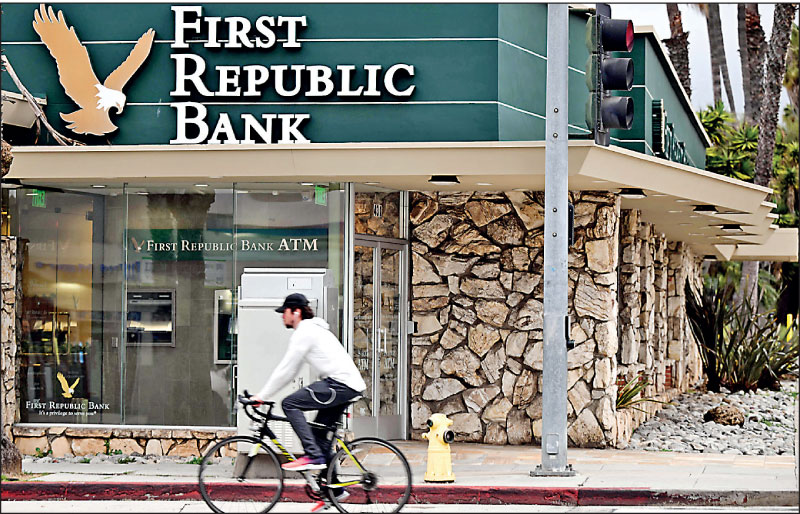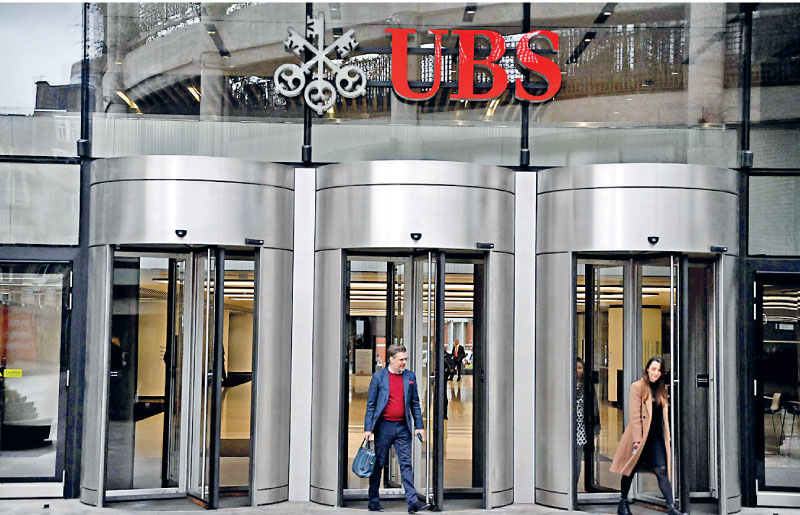Tuesday Feb 17, 2026
Tuesday Feb 17, 2026
Friday, 24 March 2023 01:18 - - {{hitsCtrl.values.hits}}

Signage is displayed outside of a First Republic Bank branch in Santa Monica, California on 20 March 2023

People use the entrance of the London office of Swiss bank UBS in central London, on 20 March 2023

A photo taken on 20 March 2023 shows a branch of Swiss bank Credit Suisse in downtown Milan
 An international news agency asked me this: “What are the lessons for Sri Lanka from the Credit Suisse collapse?” I responded by saying 2 lessons. The first managing the optics and consistently ensuring governance and competence at Board Level. Last week after tense talks, UBS Group AG agreed to buy Credit Suisse in an all-share deal for about $ 3.25 billion. The government-brokered sale marks the Swiss bank’s final fall from a position of power and respect, succumbing to a crisis of confidence that threatened to spread to global financial markets in the West.
An international news agency asked me this: “What are the lessons for Sri Lanka from the Credit Suisse collapse?” I responded by saying 2 lessons. The first managing the optics and consistently ensuring governance and competence at Board Level. Last week after tense talks, UBS Group AG agreed to buy Credit Suisse in an all-share deal for about $ 3.25 billion. The government-brokered sale marks the Swiss bank’s final fall from a position of power and respect, succumbing to a crisis of confidence that threatened to spread to global financial markets in the West.
According to public data for 166 years, Credit Suisse helped position Swiss Banks as the backbone of international finance and went in par with Wall Street Big brothers before a steady rhythm of financial scandals, legal issues and bad boardroom and management disruptions undermined investor confidence. Whilst research indicates the rot was years in the making, the end came very quickly. That is normally the case when a bank crashes unceremoniously as a result of huge withdrawal of deposits largely driven by panic.
Systemically important bank
Identified as one of the world’s 30 systemically important banks, Credit Suisse is today the biggest casualty of the financial turmoil triggered by central banks as they overly tightened monetary policy to rein in inflation without understanding how businesses make money. While concerns about further runs are sure to persist due to unnecessary speculation, the sale to rival UBS avoided a disastrous collapse of the Swiss Banking system. In the current environment, it is still very risky for banks as there is still a lot of uncertainty globally triggered by several factors including the war in Ukraine. Sri Lanka therefore needs to be extremely watchful of the developments in the global financial markets.
Bank runs are more often the result of large surprises to Non-Executive Directors and Regulators that are not flagged early by risk departments due to crazy bonus structures and powerful shareholders.
Governance and bad management
The mistakes most regulators and shareholders make is that they appoint their agents who have no clue how banks are run as Directors. What is more important is to ensure boards are made liable for any losses at the bank for at least one year. Skin in the game is absolutely key to averting financial crises. Secondly they focus on lending deals and thirdly appoint people with dubious and vested interests. Banks are run on public money. Shareholder funds are less than 10% of the total capital employed. Therefore the regulator has a huge responsibility to administer the fit and proper test practically and judiciously.
Take the Silicon Valley Bank. The collapse happened for multiple reasons, including a lack of a decent spread and a vanilla bank run due to crazy speculation, where big customers withdrew their deposits simultaneously due to fears of the bank’s solvency, speculated by bloggers and journalists. The regulator must insist on a level 2 independent CRO, constantly deployed with a credible succession and competent board risk committees, chaired by the best talent on the boards. When SVB’s Chief Risk officer left in the spring of 2022, it wasn’t until January of the following year that they hired a replacement. Risk-reward balance should drive the banks and ownership for risk fairly and squarely pinned to the board, the board chair, the risk committee chair and the risk committee itself. Danny Moses, in his book The Big Short, noted in 2008, it’s just bad risk management.
In the final analysis Regulators must not allow people to jump into conclusions during stressed moments for a bank. Iris Chiu, a professor of corporate law and financial regulation at University College London, said banks may be more vulnerable to “information contagion” and market panic following post-2008 reforms that put shareholders on the hook for losses in order to spare taxpayers. Given this trend the regulatory system requires serious monitoring and review of a high order continuously by experts.
There are key lessons for Sri Lanka from the two recent crashes. As a country we need to work towards stronger and bigger banks and competent and credible boards. This is why the fit-and-proper-person test, a test aiming to prevent corrupt, incompetent or untrustworthy people from serving on financial sector boards, needs to be used in its true form.
References:
https://cepr.org/voxeu/columns/silicon-valley-bank-collapse-prudential-regulation-lessons-europe-and-world
https://amp.cnn.com/cnn/2023/03/21/investing/credit-suisse-banking-crisis-bear-stearns/index.html
(The writer was Chairman of the largest two private Commercial Banks and Chaired the Banking Sector Consolidation Committee in 2015/16.)